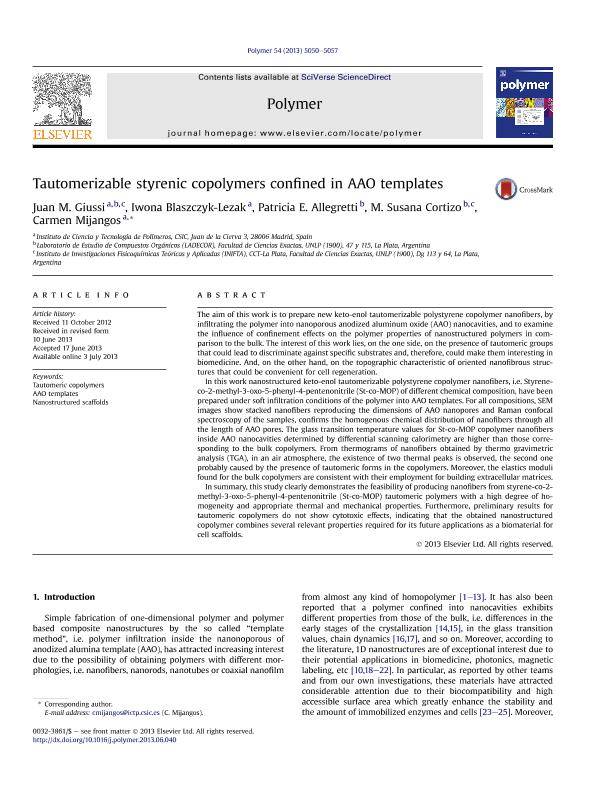Mostrar el registro sencillo del ítem
dc.contributor.author
Giussi, Juan Martín

dc.contributor.author
Blaszczyk Lezak, Iwona
dc.contributor.author
Allegretti, Patricia Ercilia

dc.contributor.author
Cortizo, Maria Susana

dc.contributor.author
Mijangos Ugarte, Carmen

dc.date.available
2016-04-08T21:40:29Z
dc.date.issued
2013-08
dc.identifier.citation
Giussi, Juan Martín; Blaszczyk Lezak, Iwona; Allegretti, Patricia Ercilia; Cortizo, Maria Susana; Mijangos Ugarte, Carmen; Tautomerizable styrenic copolymers confined in AAO templates; Elsevier; Polymer; 54; 18; 8-2013; 5050-5057
dc.identifier.issn
0032-3861
dc.identifier.uri
http://hdl.handle.net/11336/5105
dc.description.abstract
The aim of this work is to prepare new keto-enol tautomerizable polystyrene copolymer nanofibers, by infiltrating the polymer into nanoporous anodized aluminum oxide (AAO) nanocavities, and to examine the influence of confinement effects on the polymer properties of nanostructured polymers in comparison to the bulk. The interest of this work lies, on the one side, on the presence of tautomeric groups that could lead to discriminate against specific substrates and, therefore, could make them interesting in biomedicine. And, on the other hand, on the topographic characteristic of oriented nanofibrous structures that could be convenient for cell regeneration. In this work nanostructured keto-enol tautomerizable polystyrene copolymer nanofibers, i.e. Styreneco- 2-methyl-3-oxo-5-phenyl-4-pentenonitrile (St-co-MOP) of different chemical composition, have been prepared under soft infiltration conditions of the polymer into AAO templates. For all compositions, SEM images show stacked nanofibers reproducing the dimensions of AAO nanopores and Raman confocal spectroscopy of the samples, confirms the homogenous chemical distribution of nanofibers through all the length of AAO pores. The glass transition temperature values for St-co-MOP copolymer nanofibers inside AAO nanocavities determined by differential scanning calorimetry are higher than those corresponding to the bulk copolymers. From thermograms of nanofibers obtained by thermo gravimetric analysis (TGA), in an air atmosphere, the existence of two thermal peaks is observed, the second one probably caused by the presence of tautomeric forms in the copolymers. Moreover, the elastics moduli found for the bulk copolymers are consistent with their employment for building extracellular matrices. In summary, this study clearly demonstrates the feasibility of producing nanofibers from styrene-co-2-methyl-3-oxo-5-phenyl-4-pentenonitrile (St-co-MOP) tautomeric polymers with a high degree of homogeneity and appropriate thermal and mechanical properties. Furthermore, preliminary results for tautomeric copolymers do not show cytotoxic effects, indicating that the obtained nanostructured copolymer combines several relevant properties required for its future applications as a biomaterial for cell scaffolds.
dc.format
application/pdf
dc.language.iso
eng
dc.publisher
Elsevier

dc.rights
info:eu-repo/semantics/openAccess
dc.rights.uri
https://creativecommons.org/licenses/by-nc-sa/2.5/ar/
dc.subject
AAO TEMPLATES
dc.subject
NANOSTRUCTURED SCAFFOLDS
dc.subject
TAUTOMERIC COPOLYMERS
dc.subject.classification
Físico-Química, Ciencia de los Polímeros, Electroquímica

dc.subject.classification
Ciencias Químicas

dc.subject.classification
CIENCIAS NATURALES Y EXACTAS

dc.title
Tautomerizable styrenic copolymers confined in AAO templates
dc.type
info:eu-repo/semantics/article
dc.type
info:ar-repo/semantics/artículo
dc.type
info:eu-repo/semantics/publishedVersion
dc.date.updated
2016-05-06 15:52:43.262787-03
dc.journal.volume
54
dc.journal.number
18
dc.journal.pagination
5050-5057
dc.journal.pais
Países Bajos

dc.journal.ciudad
Amsterdam
dc.description.fil
Fil: Giussi, Juan Martín. Consejo Nacional de Investigaciones Científicas y Técnicas. Centro Científico Tecnológico la Plata. Instituto de Investigaciones Fisicoquímicas Teóricas y Aplicadas; Argentina. Instituto En Ciencia y Tecnologia de Polimeros; España. Universidad Nacional de la Plata. Facultad de Cs.exactas. Departamento de Quimica. Laboratorio de Est.de Compuestos Organicos; Argentina
dc.description.fil
Fil: Blaszczyk Lezak, Iwona. Instituto En Ciencia y Tecnologia de Polimeros; España
dc.description.fil
Fil: Allegretti, Patricia Ercilia. Universidad Nacional de la Plata. Facultad de Cs.exactas. Departamento de Quimica. Laboratorio de Est.de Compuestos Organicos; Argentina. Consejo Nacional de Investigaciones Científicas y Técnicas; Argentina
dc.description.fil
Fil: Cortizo, Maria Susana. Consejo Nacional de Investigaciones Científicas y Técnicas. Centro Científico Tecnológico la Plata. Instituto de Investigaciones Fisicoquímicas Teóricas y Aplicadas; Argentina. Universidad Nacional de la Plata. Facultad de Cs.exactas. Departamento de Quimica. Laboratorio de Est.de Compuestos Organicos; Argentina
dc.description.fil
Fil: Mijangos Ugarte, Carmen. Instituto En Ciencia y Tecnologia de Polimeros; España
dc.journal.title
Polymer

dc.relation.alternativeid
info:eu-repo/semantics/altIdentifier/url/http://www.sciencedirect.com/science/article/pii/S0032386113005880
dc.relation.alternativeid
info:eu-repo/semantics/altIdentifier/doi/http://dx.doi.org/10.1016/j.polymer.2013.06.040
Archivos asociados
